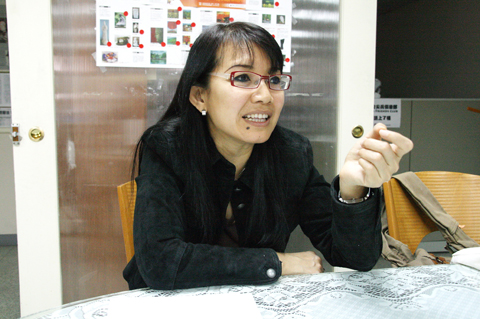|
¡@
Never take your freedom for granted:
activist
By Loa Iok-sin
STAFF REPORTER
Sunday, Mar 21, 2010, Page 3

Exiled Myanmar democracy activist Khin Ohmar
gestures during an interview with the Taipei Times on March 7.
PHOTO: LOA IOK-SIN, TAIPEI TIMES
While enjoying political freedom, Taiwanese should not take
it for granted and should be aware that they may lose it if they do not take the
necessary measures to protect it, exiled Burmese democracy activist Khin Ohmar
said.
In an interview with the Taipei Times on March 7, Ohmar reminded Taiwanese, who
she considers to be Myanmar¡¦s partners for democracy, of the importance of
remaining vigilant.
Ohmar took part in student demonstrations against the Myanmar military junta in
March 1988. She was also one of the key members who planned another wave of
massive nationwide student protests in August the same year that ended in a
bloody crackdown by the government.
By the end of 1988, an estimated 10,000 people ¡X including protesters and
soldiers ¡X had been killed in conflicts following the uprising.
The demonstrations, which began on Aug. 8, 1988, later came to be known as the
¡§8888 Popular Uprising.¡¨
Many of the people who planned and took part in the demonstrations fled the
country, but Ohmar and some others stayed in the country, hoping to find other
opportunities to launch another uprising to overthrow the military government.
They failed, however, and finally crossed the border into Thailand at the end of
the year.
¡§We took a month to organize [another wave of demonstrations], but we failed,¡¨
she said. ¡§We were chased down by intelligence agencies, we couldn¡¦t go home and
we couldn¡¦t find any people who would accept us.¡¨
From Thailand, Ohmar continues to promote democracy in Myanmar and is now a
member of the Burma Partnership, an organization which aims to coordinate
international efforts for democracy in her home country.
In 1988, Ohmar was a 19-year-old chemistry student at the Rangoon Arts and
Science University ¡X later renamed Yangon University ¡X who had never been
involved or had much interest in politics before, other than occasionally
complaining about a few unfair regulations at school.
March 16, 1988, was the day Ohmar¡¦s life changed completely.
She took part in a demonstration organized by students from a number of nearby
universities after several students at the Yangon Technological University were
arrested and detained without questioning for clashing with young people from
the neighborhood ¡X people who happened to be the children of government
officials.
She joined the action because she believed the detention of students without due
process was an injustice.
At the demonstration, more terrible scenes awaited her.
¡§We were blocked at one end [of a street] by the army, and on the other side,
riot police cars were coming,¡¨ she said. ¡§When students negotiated with the
soldiers, the riot police had already started beating people.¡¨
She fled with others, only to see more students being beaten and dragged into
cars by police.
Horrified and angered because she could not understand why the authorities were
acting so violently toward unarmed students who were marching peacefully, Ohmar
was determined to fight for justice.
¡§I made up my mind that day to do everything for justice,¡¨ she said.
To avoid further demonstrations, the military government closed down
universities in Yangon from March to June and ordered all students to go back to
their hometowns. However, students used the opportunity to spread the news
across the country, Ohmar said.
In June, when schools reopened, students again took to the streets to demand the
release of those arrested during the March demonstrations.
¡§Originally, we only thought about getting the students back to school. But
then, when we realized our action had the support of the general public, we
started thinking about ending the one-party system.¡¨
Although the 8888 Popular Uprising failed, it took many months to plan by the
student activists
Since Taiwan and China share a common language, Ohmar hopes that Taiwanese can
help the people of Myanmar in their struggle for freedom by sending a message to
China urging them to stop supporting the military regime in Myanmar both
financially and militarily.
She said that the military regime¡¦s iron-fist rule has led to the formation of
armed resistance groups, especially among ethnic minorities in Myanmar¡¦s border
areas.
Chaotic situations in these areas have already facilitated the movement of
drugs, illegal immigrant workers and refugees across the border into China¡¦s
Yunnan Province.
If the authoritarian rule continues, the situation will only deteriorate and if
an all-out civil war breaks out in Myanmar, China¡¦s border security would be
seriously threatened.
Despite living in exile for more than two decades, Ohmar never regretted her
participation in the anti-government rallies; rather, she regrets that she
wasn¡¦t politically aware enough before.
¡§I wish I had been more politically active earlier in my life,¡¨ she told the
Taipei Times. ¡§If we had been more cautious about what was to come, we could
have taken preventive measures.¡¨
Based on her personal experiences, Ohmar is urging Taiwanese to be more
cautious about their hard-earned democracy.
Even though Taiwan enjoys freedom and democracy, its people should tread
carefully, especially since China still claims it as part of its territory and
is trying to tempt it with its economic power, she said.
¡§Gaining freedom for Taiwan is not free. It¡¦s very important you don¡¦t take it
for granted. If you take it for granted there¡¦s a chance you¡¦ll lose it. And
when you lose it, it¡¦s difficult to get it back, especially when you¡¦re facing
an enemy with power and money,¡¨ she said.
Ohmar said that while most ordinary people seem to care more about economics
than politics, everything would actually come down to politics in the end.
¡§Without political freedoms, we would lose economic freedom and prosperity,¡¨ she
said. ¡§It¡¦s like a bird in a golden cage. You¡¦re fed with good food everyday,
but you¡¦re a bird, you want to fly.¡¨
¡@
|
![]()
![]()
![]()